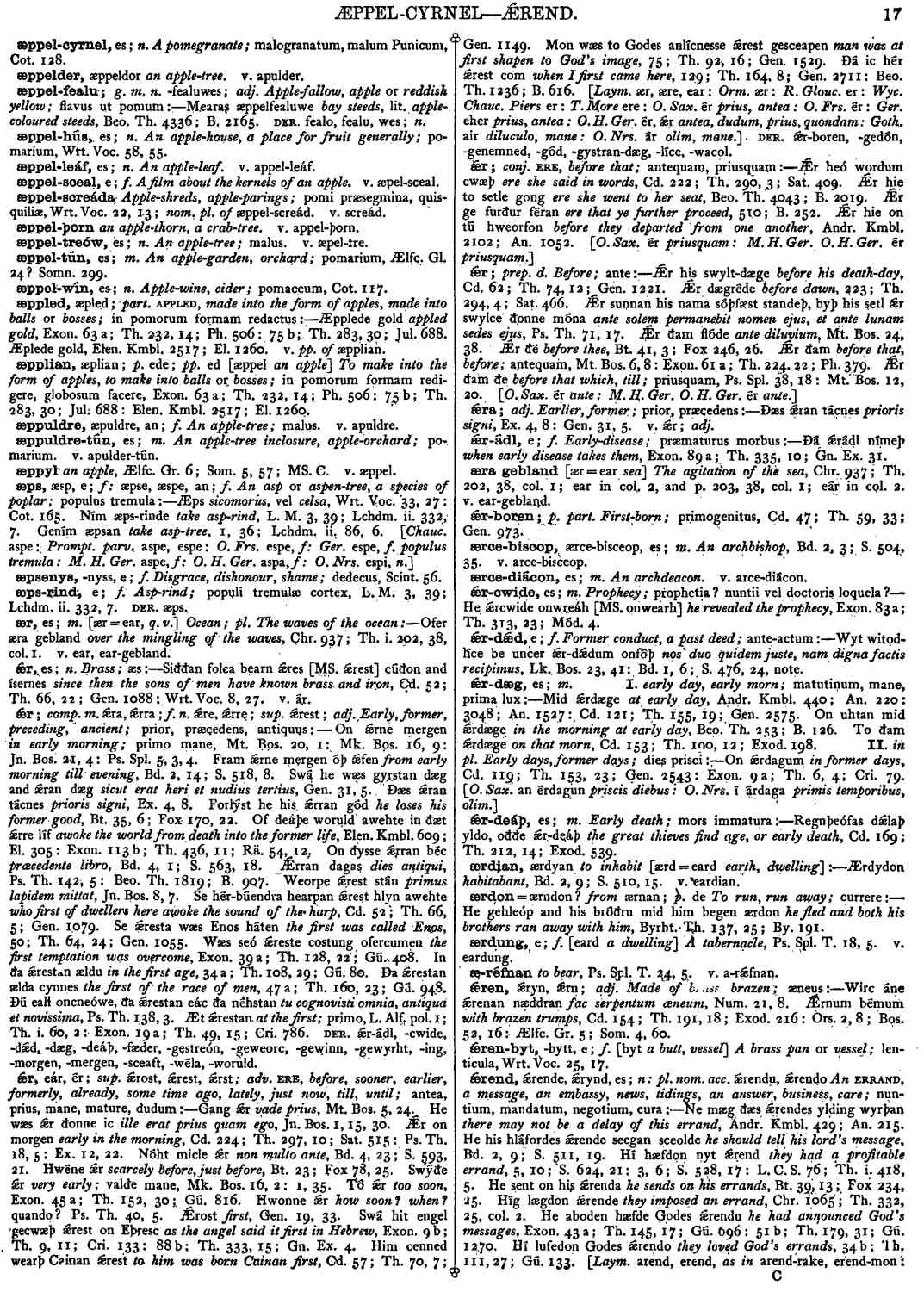ǽr
- adjective
-
On ǽrne mergen
in early morning;
primo mane
,- Mt. Bos. 20, 1 :
- Mk. Bos. 16, 9 :
- Jn. Bos. 21, 4 :
- Ps. Spl. 5, 3, 4 .
-
Fram ǽrne mergen óþ ǽfen
from early morning till evening,
- Bd. 2, 14; S. 518, 8 .
-
Swá he wæs gyrstan dæg and ǽran dæg
sicut erat heri et nudius tertius,
- Gen. 31, 5 .
-
Ðæs ǽran tácnes
prioris signi,
- Ex. 4, 8 .
-
Forlýst he his ǽrran gód
he loses his former good,
- Bt. 35, 6; Fox 170, 22 .
-
Of deáþe woruld awehte in ðæt ǽrre líf
awoke the world from death into the former life,
- Elen. Kmbl. 609 ;
- El. 305 :
- Exon. 113b; Th. 436, 11 ;
- Rä. 54, 12 .
-
On ðysse ǽrran béc
præcedente libro,
- Bd. 4, 1; S. 563, 18 .
-
Ǽrran dagas
dies antiqui,
- Ps. Th. 142, 5 :
- Beo. Th. 1819 ;
- B. 907 .
-
Weorpe ǽrest stán
primus lapidem mittat,
- Jn. Bos. 8, 7 .
-
Se hér-búendra hearpan ǽrest hlyn awehte
who first of dwellers here awoke the sound of the harp,
- Cd. 52; Th. 66, 5 ;
- Gen. 1079 .
-
Se ǽresta wæs Enos háten
the first was called Enos,
- 50; Th. 64, 24 ;
- Gen. 1055 .
-
Wæs seó ǽreste costung ofercumen
the first temptation was overcome,
- Exon. 39a; Th. 128, 32 ;
- Gú. 408 .
-
In ða ǽrestan ældu
in the first age,
- 34a; Th. 108, 29 ;
- Gú. 80 .
-
Ða ǽrestan ælda cynnes
the first of the race of men,
- 47a; Th. 160, 23 ;
- Gú. 948 .
-
Ðú eall oncneówe, ða ǽrestan eác ða néhstan
tu cognovisti omnia, antiqua et novissima,
- Ps. Th. 138, 3 .
-
Æt ǽrestan
at the first;
primo
,- L. Alf. pol. 1; Th. i. 60, 2 :
- Exon. 19a; Th. 49, 15 ;
- Cri. 786 .
Bosworth, Joseph. “ǽr.” In An Anglo-Saxon Dictionary Online, edited by Thomas Northcote Toller, Christ Sean, and Ondřej Tichy. Prague: Faculty of Arts, Charles University, 2014. https://bosworthtoller.com/731.
Checked: 1